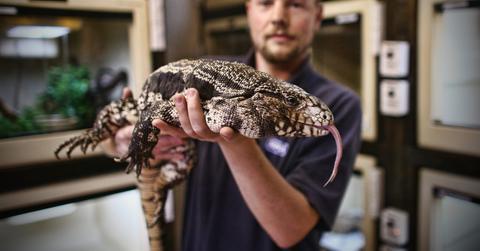The Tegu Lizard, an Invasive Florida Species, Has Made Its Way to Georgia
Published April 12 2022, 12:28 p.m. ET

Generally when an invasive species comes to mind, we think of a strangler vine killing an innocent tree, nasty bugs, or weeds. But an invasive species that has reportedly been plaguing Florida for a while now has made its way to Georgia.
And although it's seemingly harmless based on its somewhat cute appearance, the tegu lizard's Georgia sighting is making conservationists worried for other species in the state's ecosystem.
“They can live almost anywhere and eat almost anything,” DNR wildlife biologist Daniel Sollenberger stated in a press release regarding the most recent Georgia sighting, according to Sun Sentinel.
“We are focusing our efforts to accomplish two goals: document the extent of where tegus occur in the wilds of southeast Georgia and remove those animals as soon as we can after they are detected," he said.
"With area residents, hunters and other folks helping us keep an eye out for and controlling tegus, we are cautiously optimistic we can control this population,” Sollenberger continued, per Sun Sentinel.
Needless to say, conservationists are incredibly worried about the spread of this highly adaptive pest.
What to know about the spread of the tegu lizard:
With warming outdoor temperatures comes an influx of the invasive South American lizard species, the tegu. In Georgia, these pests have become increasingly more common, according to 11Alive, especially over the last few months. The state's Department of Natural Resources is hoping to stop the expansion of the species by having people report sightings. It's a relentless predator that was first spotted in the Peach State in 2018, and has continued to be an ongoing issue.
The DNR wants to stop the spread of the tegu imminently. The lizard, which can grow up to 4 feet long and weigh over 10 pounds, eats gopher tortoises, wild turkeys, and ground nesting birds. The DNR advises Georgia residents, particularly in Toombs and Tattnall counties, where they have been spotted in the past, to keep pet food inside, fill any holes where they can nest, and to clear their yards. You can also report them online, by emailing gainvasives@dnr.ga.gov, or by calling (478) 994-1438.
Tegus aren't native to Georgia, and the state's wildlife laws don't protect them. Locals can trap and kill them on private property, though it's most important to report sightings, to do your part for the state's ecosystem.
In many states it's becoming illegal to own tegus — they were most likely brought to Florida as pets, before they were released into the wild, and began to spread. They have attacked dogs in addition to undomesticated animals, so be aware if you have a small furry friends.
Why are invasive species bad?
Invasive species are bad for a number of reasons. One is because they tend to be highly adaptive — more so than even species that are native to the region. Oftentimes, they will prey on certain species in their non-native ecosystems. They also steal shelter and food from other native species. This completely throws off the natural flow of the ecosystem, sometimes leading to native species' decline.
Invasive species are becoming more of a problem with the ongoing climate crisis. Many of them tend to do well in warmer climates, and as more climates tend to get warmer, they can more easily spread to other regions.
Hopefully the spread of the tegu is stopped soon — or else they may spread far beyond Georgia and Florida.
Green Matters’ new book, Green Living, is the perfect guide to living an eco-friendly lifestyle for people at every stage of the process. You can order Green Living here.